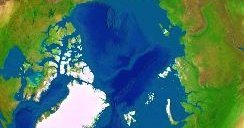Due to the effects of climate change, the Arctic region has increasingly become the site of a power-grabbing among states that seek control over the Northwest Passage. This passage is sea route that, until recently, was deemed impassable due to the heavy pack ice that covers it for the majority of the year. Now that the pack ice is shrinking, regular marine shipping and new oil exploration possibilities are becoming a reality. The passage offers cargo ships the ability to cut the travel time of traditional trade routes between Europe and Asia (currently funnelled through the Suez Canal) nearly in half. Trans-Atlantic shipping routes would also be one-forth shorter using the Northern Passage rather than the current pathway through the Panama Canal. At a time when a the cost of crude oil exceeds $100 a barrel, the development of the expeditious Northwest Passage and the untapped petroleum reserves in the region pose serious questions of Arctic sovereignty to the five states that lay geographic claim to the region: the United States, Canada, Russia, Norway and Denmark.
In an effort to address the political and commercial significance of the Arctic, the United Nations Convention on the Law of the Sea (UNCLOS) entered into force in 1994. It gave states a period of 10 years after ratification to extend the 370 kilometre economic zones established by the treaty around each of their coasts. For this reason, four of the five aforementioned states quickly ratified UNCLOS and are funding projects that would give them the legitimacy to establish territorial claims over Arctic waters. The United States is the only exception; although a signatory of UNCLOS, it has yet to ratify it in the Senate.
A rising concern comes by way of Russia’s heavy-handed assertions of Artic ownership.
The issue of Arctic policy will set a peculiar challenge to the European community when self-government referenda are held in Greenland in 2008. Independence from Denmark has become a topic increasingly discussed among political groups in Greenland due to the new opportunities for exploitation of natural resources derived from the effects of climate change.
Another rising concern comes by way of Russia’s heavy-handed assertions of Arctic ownership. In August of 2007, Russia sent two submarines to the Arctic floor beneath the North Pole and anchored a Russian flag made of rust-proof titanium to the seabed. The mission was characterised by Russia as a scientific expedition, but the flag has prompted concerns of a race for control of the Arctic’s potentially vast petroleum resources. Moscow is currently petitioning the UN to brand the Lomonosov Ridge a natural extension of Russian territory. If they are successful, Russia could lay claim 1.1 million square kilometres of Arctic waterways and the natural resources associated with them. The fact that these issues come at a time when Europe is struggling to wean itself off of dependence upon Russian oil should not be lost upon EU policy makers.
The climate change issue is one that moots an ever looming crisis not only in terms of environmental concerns, but also on how to manage emerging business and political interests. Awareness and engagement on the part of citizens and governments is needed to ensure an equitable division of resources in the Arctic. Special measures also need to be taken to ensure that the rights of native populations in the five Arctic states are taken into consideration. Whatever benefits result from oil exploration and new trade routes must be partially redistributed to these communities. The Arctic Council, established in 1996, is an intergovernmental forum that aims to achieve this. The Council provides a means for promoting co-operation, co-ordination and interaction among the Arctic States with the involvement of indigenous communities. Issues of sustainable development and environmental protection in the Arctic are top priorities for the Council, which is increasingly being courted by foreign governments who have a greedy eye on the petroleum development potential of the region.
Concerned citizens should pressure their governments to actively engage in Arctic policy within the framework set up by the Arctic Council and ensure that equitable agreements are reached regarding further development. Only through this kind of direct global participation can states - quite literally – chart the waters of globalisation’s challenges.


Follow the comments: |
|
